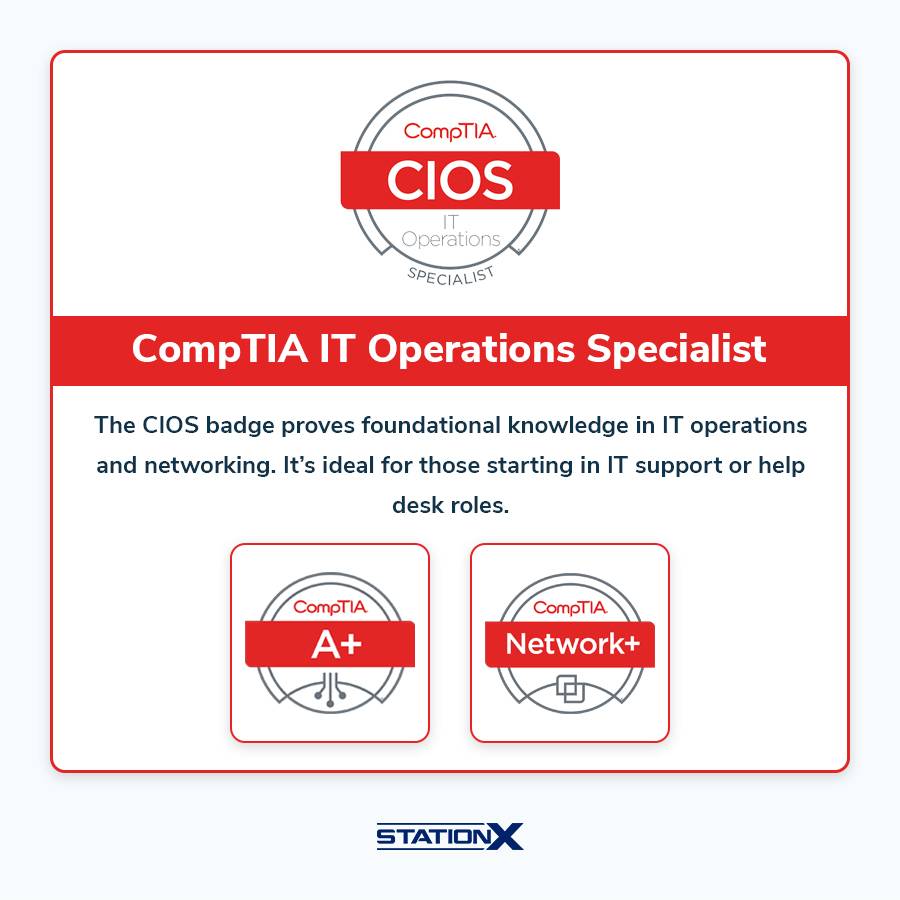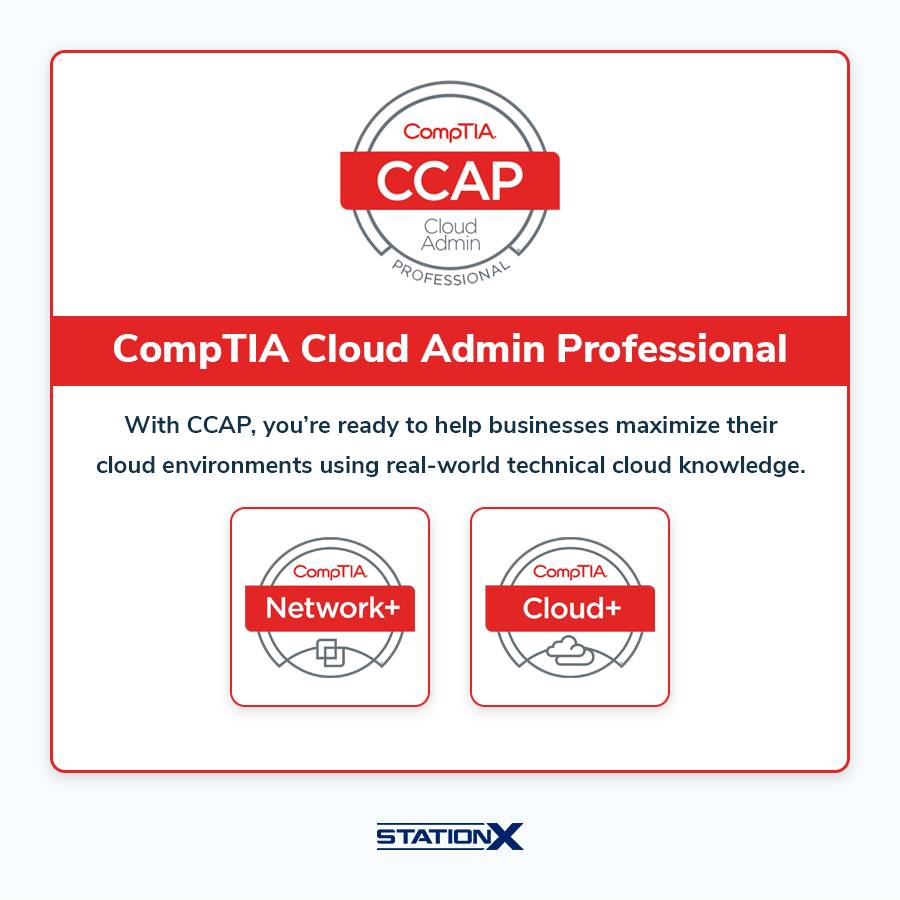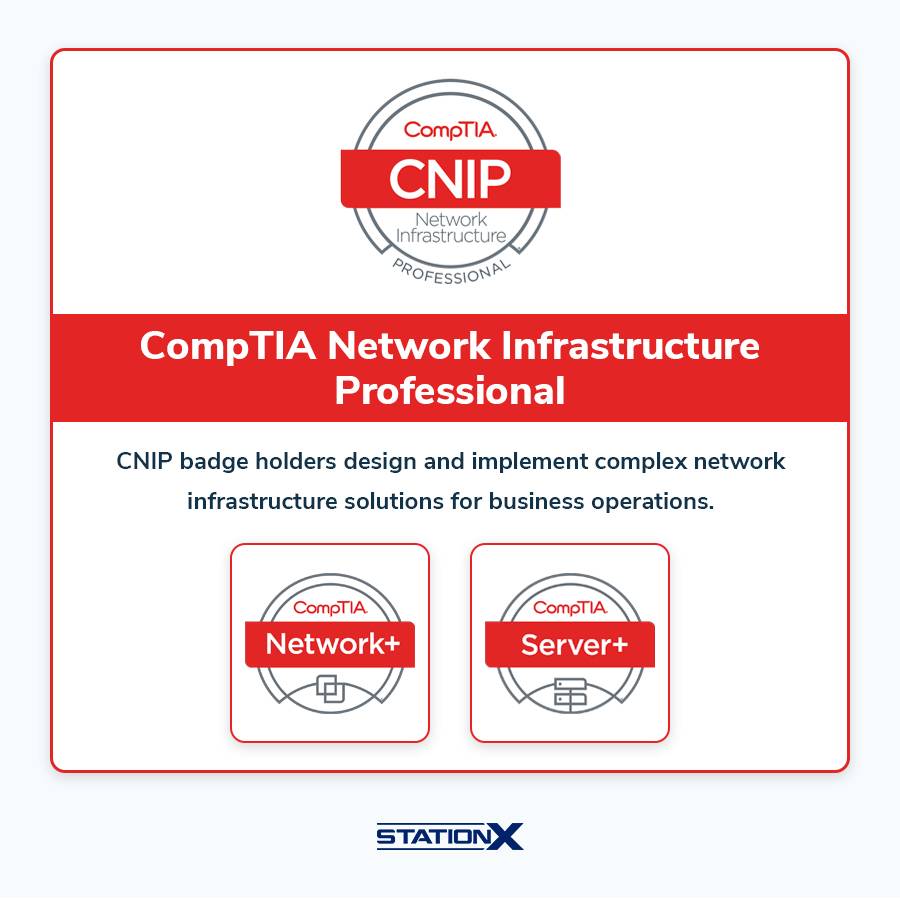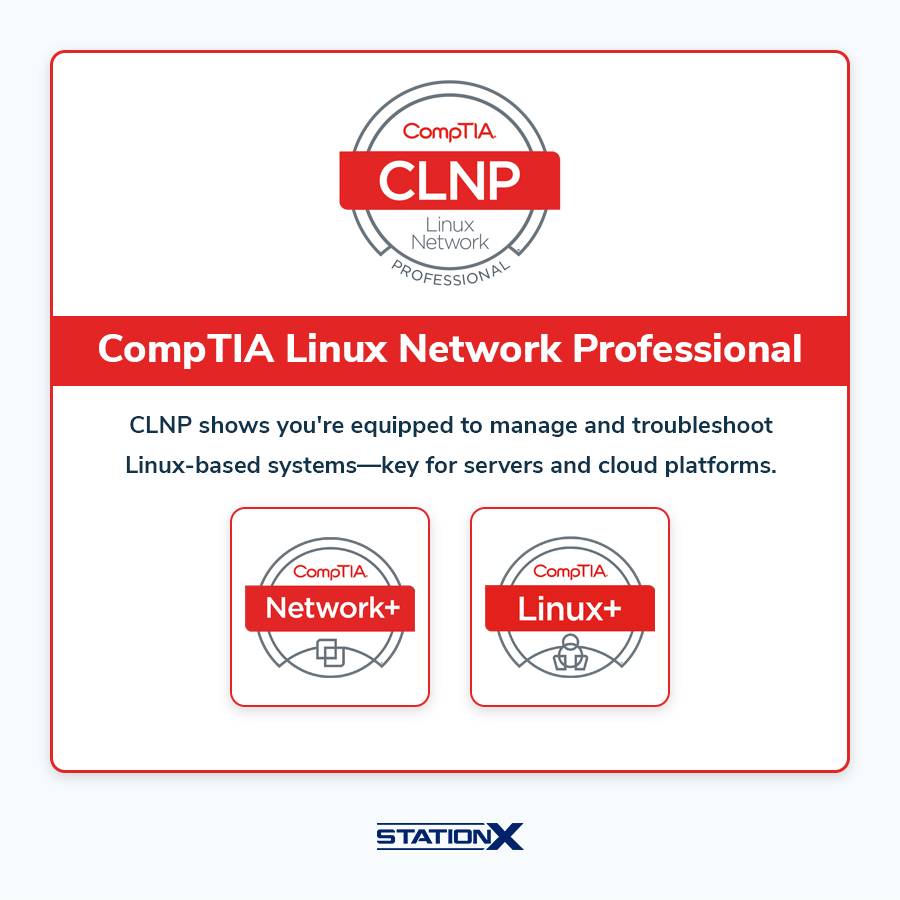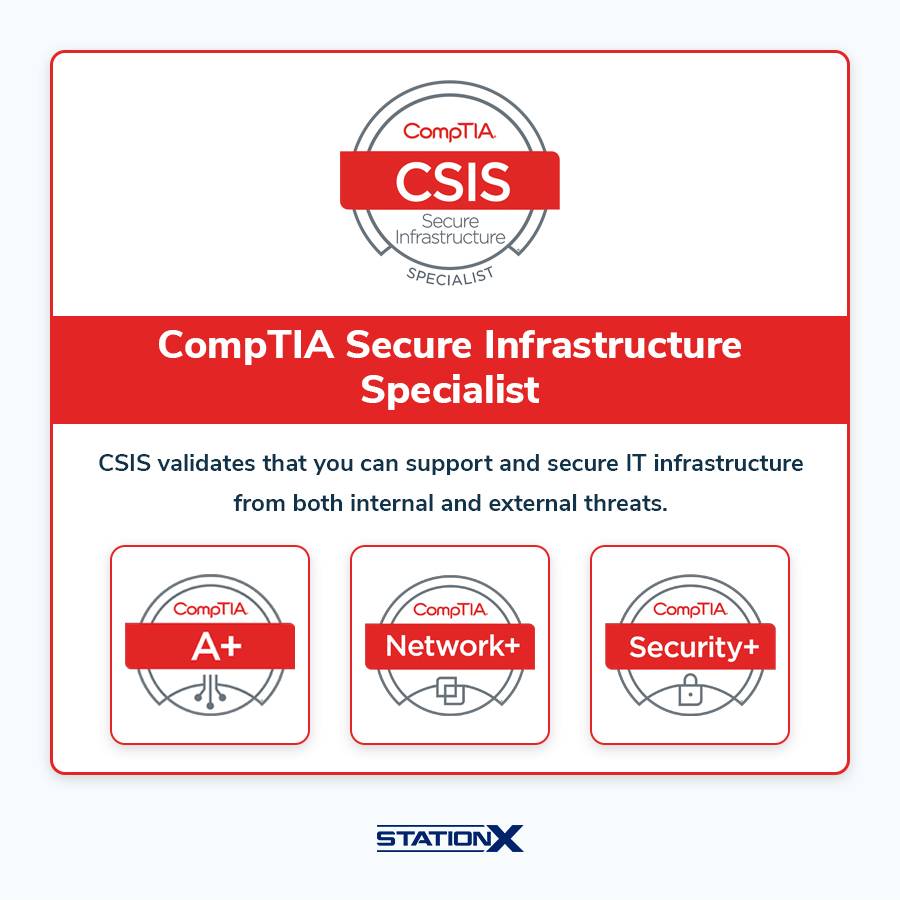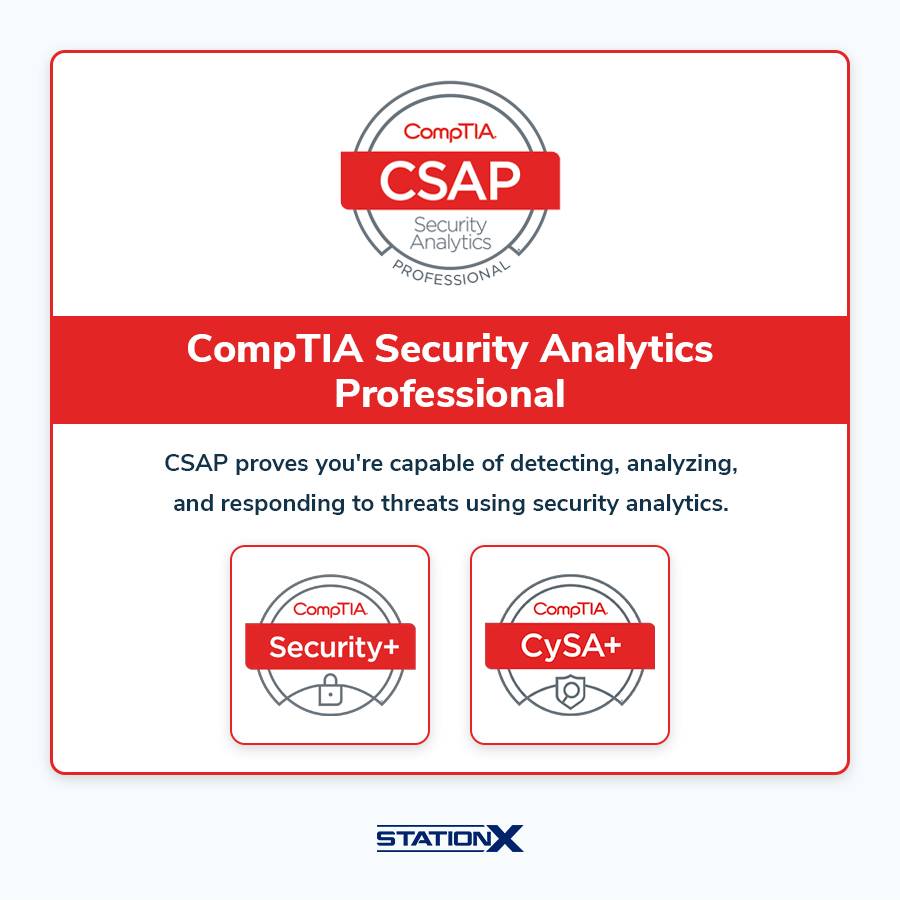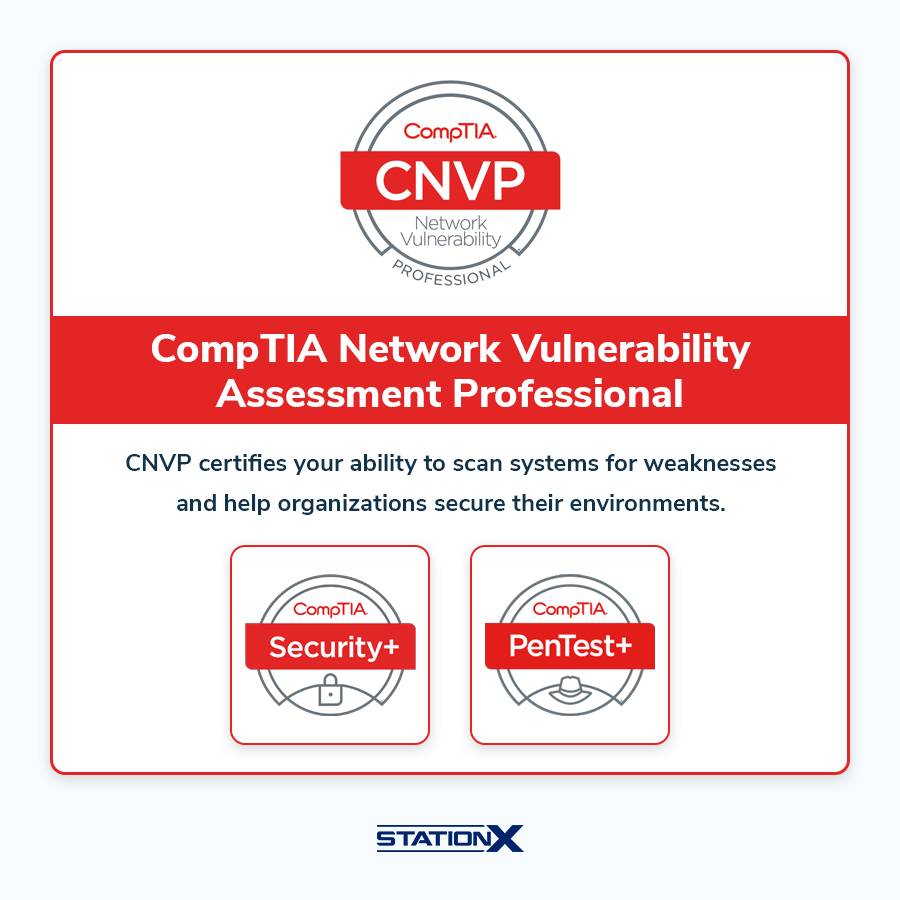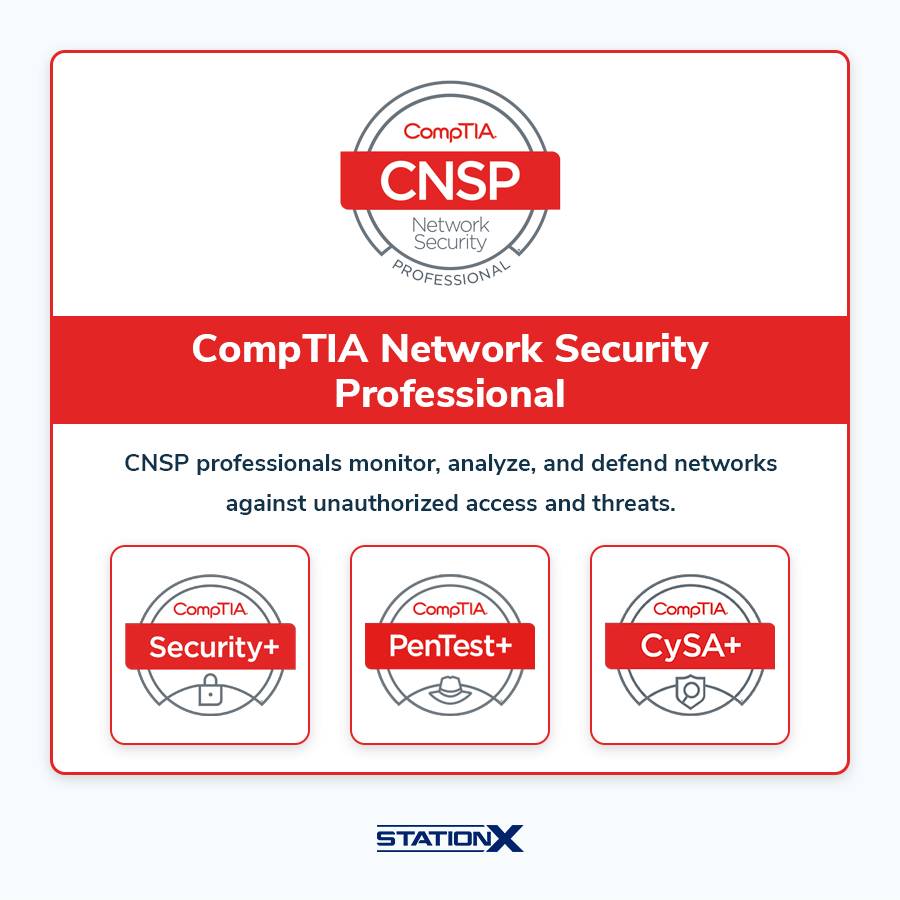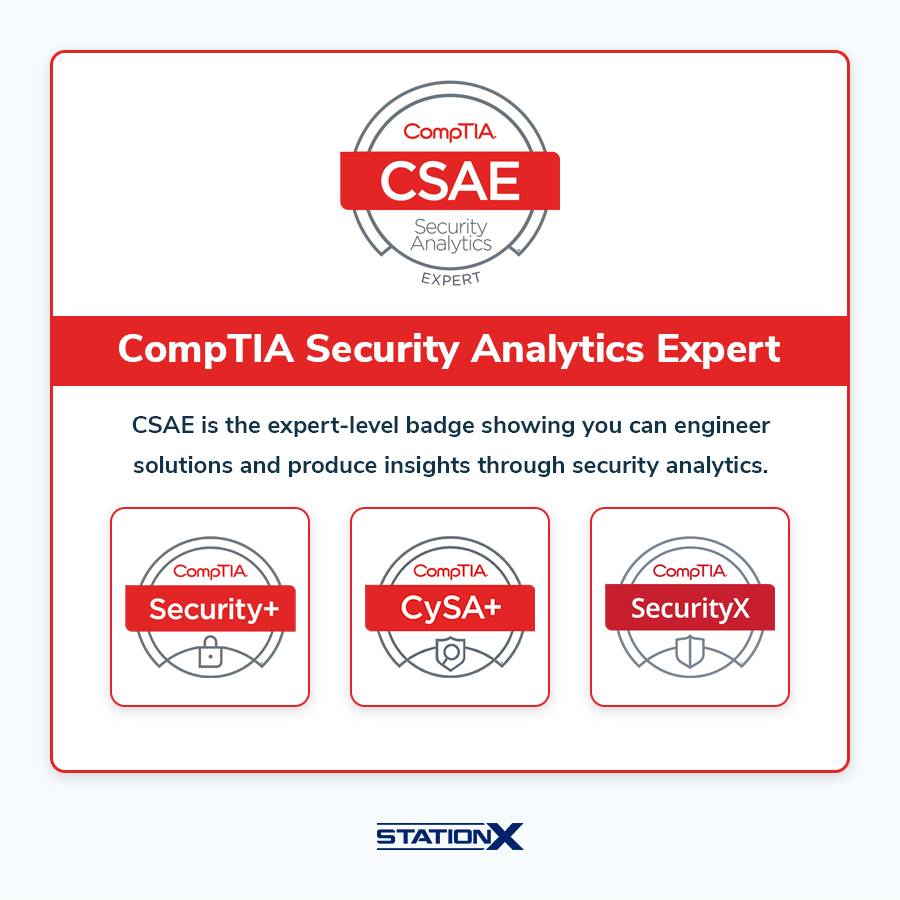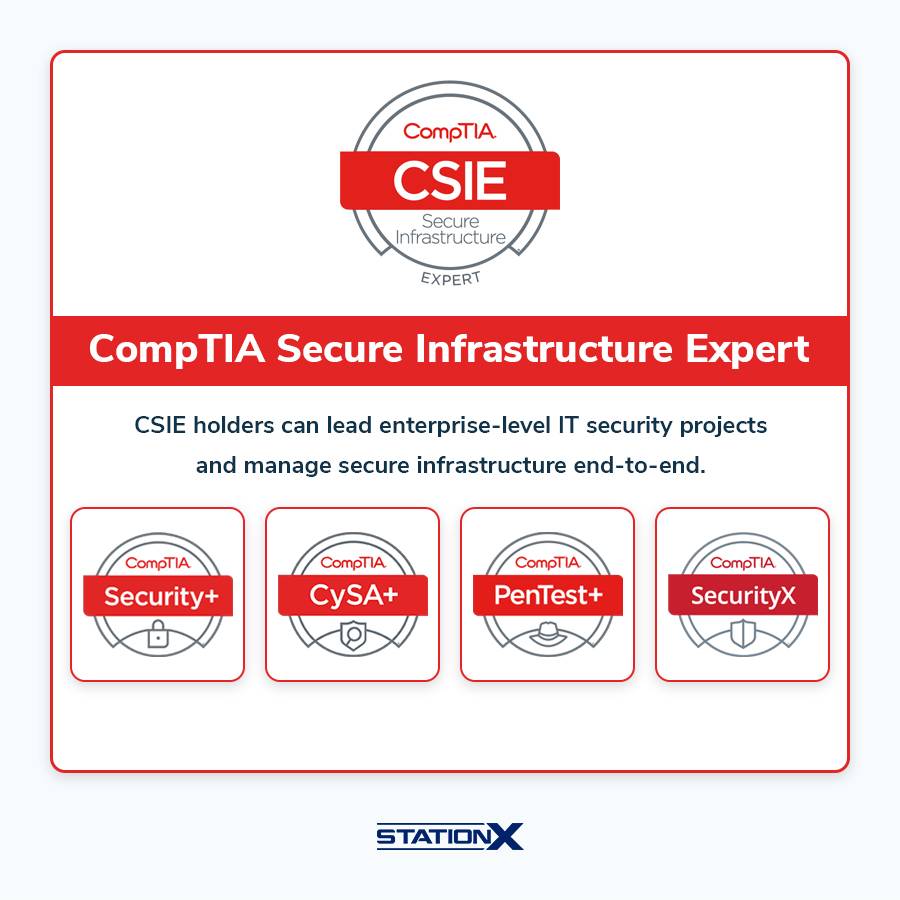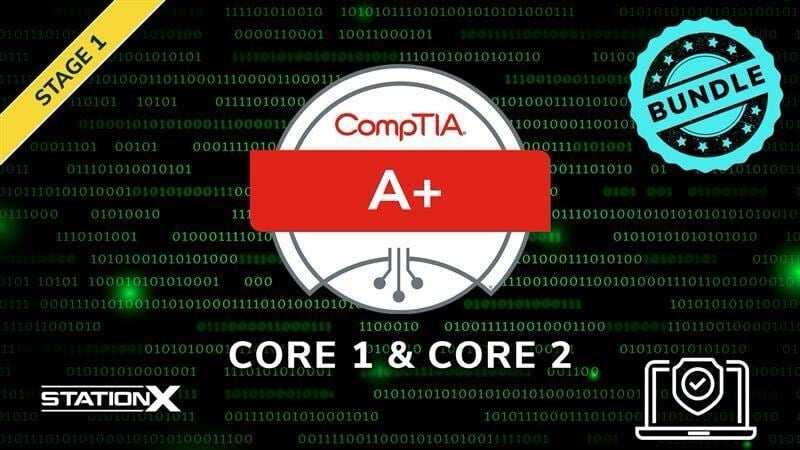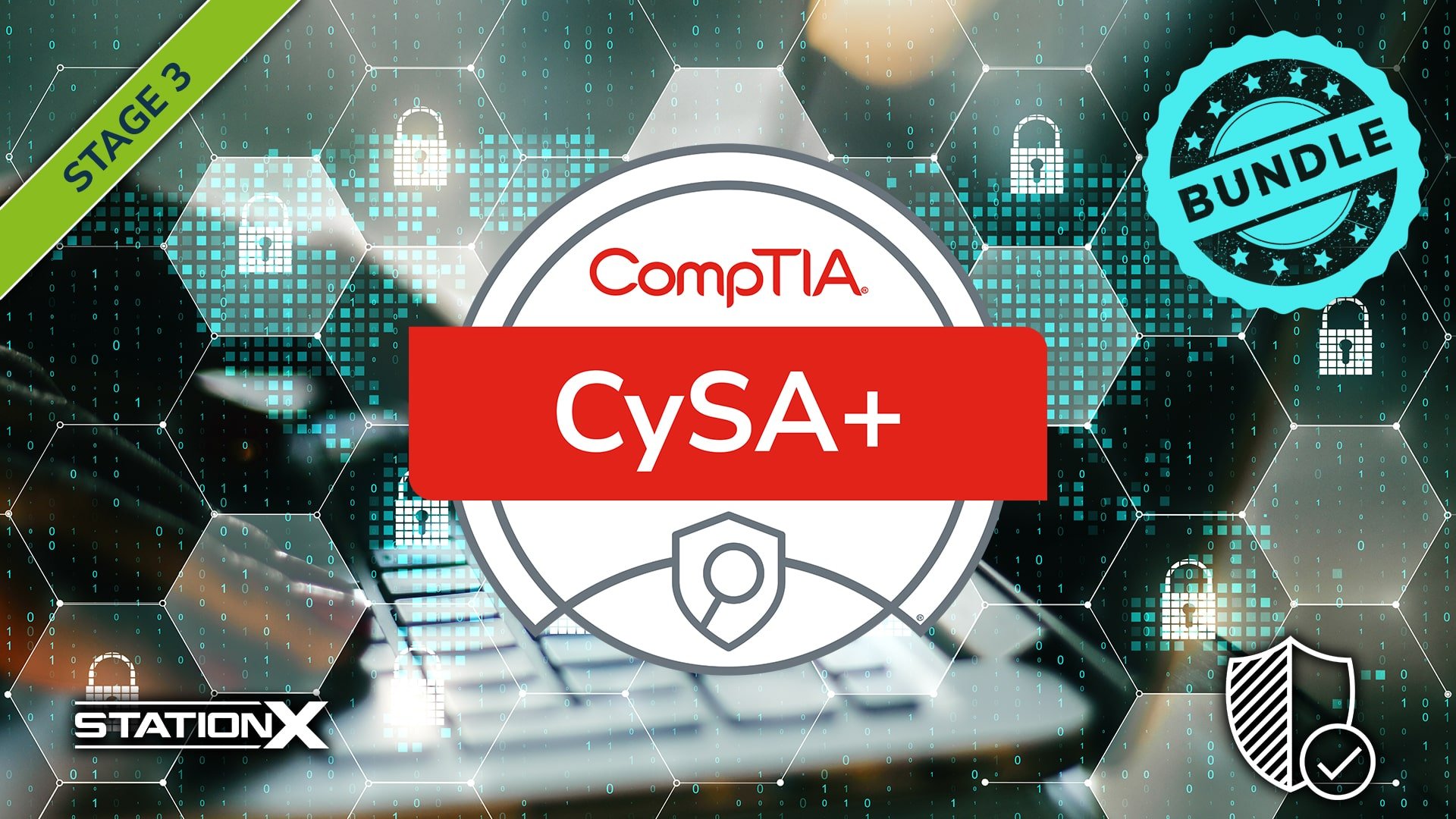CompTIA stackable certifications validate your skills in certain areas of information technology. A stackable certification is created once you have obtained the required complementary CompTIA certifications.
CompTIA offers over 15 certifications covering a range of IT specialties. To more concisely demonstrate your IT prowess, CompTIA allows you to combine these certifications into a stackable certification.
There are various stackable certifications you may obtain as you rack up CompTIA credentials. To help figure out which stackable certification you qualify for or aspire to obtain, we will explore each of CompTIA’s stackable certifications.
What are CompTIA Stackable Certifications?
CompTIA’s stackable certifications are not separate exams or new certifications. Instead, they are achievement badges that recognize when you’ve earned and maintained a combination of certifications along a specific career pathway, such as infrastructure or cyber security. These badges help visualize your professional progress and can be added to your resume or LinkedIn profile to highlight your skills in a more structured way.
Unlike individual certifications, stackable credentials don’t require passing a separate exam. They reflect your progress and specialization across foundational, professional, and expert levels in IT, allowing recruiters and managers to instantly recognize your cumulative expertise.
Career Pathways
CompTIA stackable certifications aren’t only helpful to quickly convey your IT skills to potential employers. Stackable certifications also help IT professionals effectively build on their skills by providing concrete pathways. These pathways are designed to guide IT beginners and professionals as they navigate the many areas of IT.
Pathways make it clear what you should learn next and which certification will best demonstrate your skills to an employer.
The two career pathways are Infrastructure and Cyber Security.
While regular CompTIA certifications are organized as Core Skills and Professional Skills pathways, only stackable certification pathways are only organized as Infrastructure and Cyber Security.
CompTIA’s Infrastructure Career Pathway comprises certifications that validate your IT operations skillset. They also demonstrate your knowledge of IT hardware, software, and networking. If you want to master networking, have a baseline understanding of cyber security, understand the ins and outs of Linux, cloud computing, and how servers work, this may be the career pathway for you.
Cyber Security is the second pathway. Opting for this career pathway will demonstrate that you have a deep understanding of cyber security concepts, as well as technical skills.
CompTIA has created three categories within each pathway to help aspiring stackable certification holders navigate these pathways: specialist, professional, and expert.
These categories can guide users through their career pathway of choice. Each certification needed to obtain a stackable certification is categorized based on the level of IT experience CompTIA recommends someone to have before attempting to obtain a certification.
The experience level is as follows:
- Specialist: 0-2 years of IT experience
- Professional: 2-5 years of IT experience
- Expert: 5+ years of IT experience
Infrastructure Stackable Certifications
Infrastructure stackable certifications drill down on IT basics such as networking and security before diving into more complex infrastructure material.

Specialist
The specialist CompTIA stackable certifications are CIOS and CSSS.

CIOS stands for CompTIA IT Operations Specialist. You’ll need to acquire CompTIA’s A+ and Network+ to obtain this stackable certification.
Obtaining CIOS status means you understand the basics of networking and IT support.

CSSS stands for CompTIA Systems Support Specialist. Holders of this certification are required to first obtain A+ and Linux+.
A systems support analyst should be able to work the help desk and assist with a variety of issues that require technical troubleshooting.
Professional
Professional Infrastructure stackable certifications are more advanced than specialist certifications.

CCAP is CompTIA’s Cloud Admin Professional stackable certification. To obtain it, you’ll need to acquire Network+ and Cloud+.
A cloud admin is expected to help businesses optimize their cloud computing needs.

CNIP stands for CompTIA Network Infrastructure Professional. Network+ and Server+ are required to hold the CNIP certification.
A network professional plays a hand in creating and delivering network infrastructure designs.

CLNP stands for CompTIA Linux Network Professional. Professionals need Network+ and Linux+ to obtain this certification.
Linux network professionals are capable of providing hands-on support with the Linux OS.
Cyber Security Stackable Certifications
Cyber security is the second career pathway offered by CompTIA. Those who opt for this pathway will desire to pursue a career in cyber security. These stackable certifications can be broken down into three categories.
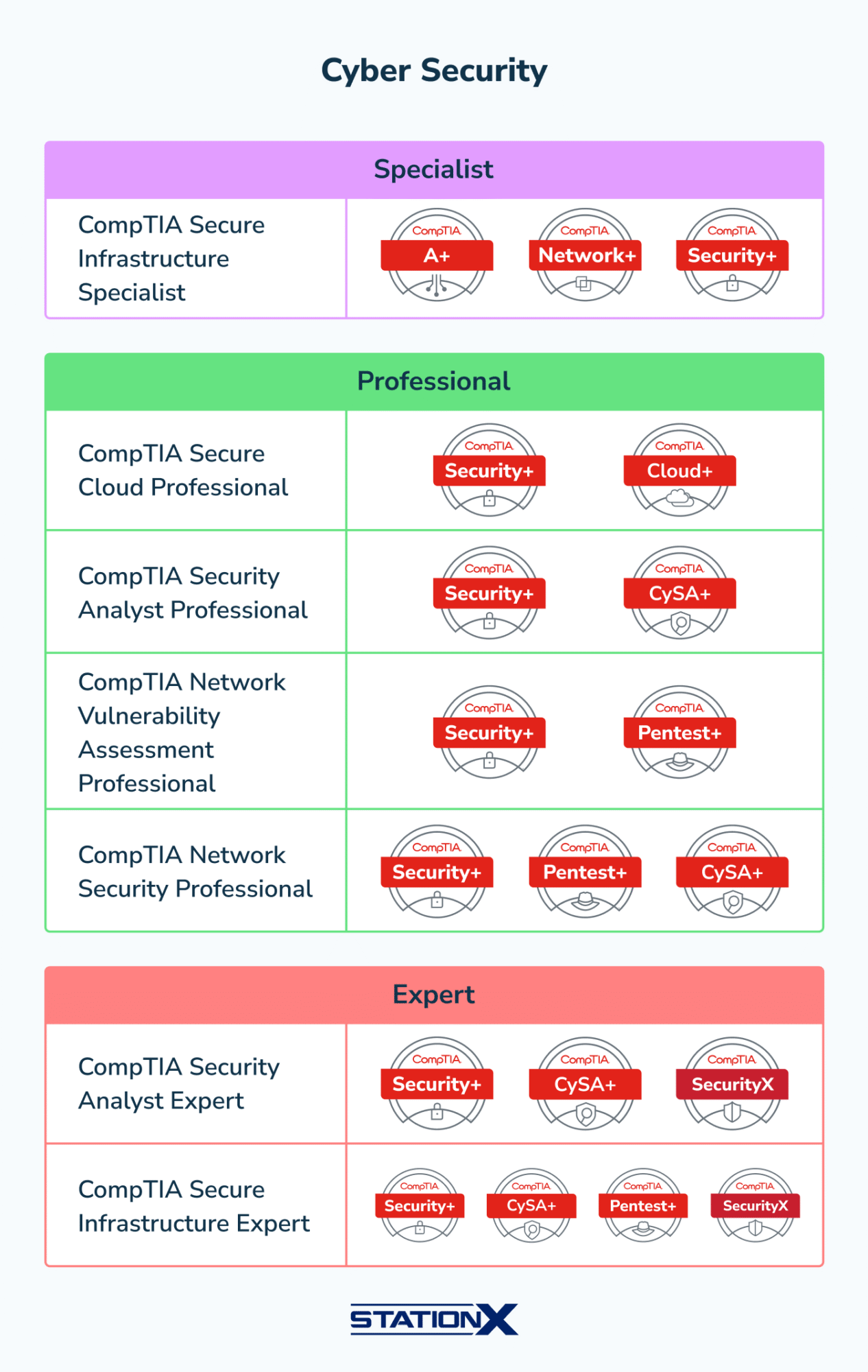
Specialist
CompTIA recommends gaining zero to two years of experience before testing for specialist certifications. However, we have found that diligent studying is all that is needed to ace these exams and obtain these certifications.

CSIS stands for CompTIA Secure Infrasturcuture Specialist. A+, Network+, and Security+ are needed to secure this stackable certification.
Despite being the most elementary stackable cyber security certification, obtaining CSIS indicates that you have the ability to protect assets from a variety of threats.
Professional
Before attempting the professional stack of certifications, CompTIA recommends you have two to five years of experience. However, with the help of effective training material and dedication, these certifications can be obtained without any prior professional experience.

CSCP, otherwise known as CompTIA Secure Cloud Professional, can be obtained if you have Security+ and Cloud+.
As a secure cloud professional, you should be able to problem-solve technical challenges related to cloud security.

CSAP stands for CompTIA Security Analytics Professional. To obtain it, you’ll first need to pass the exams for Security+ and CySA+ certifications.
Being a security analytics professional means being able to harden your organization’s assets, networks, and systems.

CNVP is CompTIA’s Network Vulnerability Assessment Professional stackable certification. To obtain it, you’ll first need Security+ and PenTest+.
A network vulnerability assessment professional can leverage software to identify and remediate vulnerabilities.

CNSP, or Network Security Professional, can be achieved by obtaining Security+, PenTest+, and CySA+.
With this stackable certification to your name you should be able to scan and monitor networks for threats and unauthorized users.
Expert
Expert stackable certifications may take years to obtain. Both stackable certifications ask you to obtain various complex certifications. Professional experience in domains tested by these exams would be a major asset in your attempt to obtain them.

CSAE stands for CompTIA Security Analytics Expert. To obtain this certification, you first need to pass exams for the following certifications: Security+, CySA+, and SecurityX.

CSIE stands for CompTIA Secure Infrastructure Expert. Four certifications are needed to obtain the CSIE. They are: Security+, CySA+, PenTest+, and SecurityX.
After obtaining CSIE you can be expected to manage and lead IT security infrastructure projects.
CompTIA Stackable Certification Renewal
All CompTIA certifications that make up stackable badges, like A+, Network+, etc., are valid for three years from the date of certification. To keep your stackable certification badge active, you must keep the underlying certifications current.
What’s helpful is that higher-tier certifications automatically renew the lower ones in the same pathway (if they are still valid when the higher cert is earned).
That means as you progress in your career and earn more advanced certifications, you’re also taking care of renewal for your previous ones. This saves on having to earn CEUs or retaking the exam.
For example, if you hold your A+ and Network+ certifications, and subsequently earn your Security+, not only to you get the CSIS (Secure Infrastructure Specialist) title, your A+ and Network+ renew for another three years.
Stackable Certificates as Career Milestones
These badges also serve a second purpose: they act as a map for career development. Want to specialize in cloud infrastructure? Follow the CIOS -> CCAP pathway. Interested in Linux systems? Combine Network+ and Linux+ to earn the CLNP badge, ideal for careers in DevOps, systems admin, or cloud support, especially since Linux is used on 98% of servers and cloud platforms.
In cyber security, paths like CSIS -> CSAP-> CSAE help learners progress from basic IT security to expert-level analytics and infrastructure security roles. These badges are ideal for signaling progression in your knowledge and skillset.
How Do I Claim a Stackable Certification?
After you have obtained the certifications needed for a stackable certification, you will automatically be awarded your stackable certification.
To find your stackable certification, simply log into your CompTIA account and go to “stackable certifications.” There you will find active and expire stackable certifications.

Conclusion
CompTIA stackable certifications are awarded automatically once you have obtained the prerequisite certifications.
These certifications are a quick and easy way to convey to employers that you have mastered certain areas within IT and/or cyber security. Leverage stackable certifications by including them on your resume, portfolio, LinkedIn, and other employer-facing documents and platforms.
Remember, you can save up to 30% on CompTIA exam vouchers through StationX. We also offer lifetime access to course bundles, including on-demand video lectures, practice exams, and flashcards to help you ace your exams. See the options below.
Lastly, if you want to accelerate your journey into information technology and cyber security, consider joining the StationX Master's Program for access to over 30,000 courses and labs, mentorship, study groups, and a personalized career roadmap.
The following course bundles are available here:
- Complete CompTIA A+ Training Bundle (Version 15)
- CompTIA Network+ Training Bundle (N10-009): 4 Courses
- CompTIA Security+ Course & SY0-701 Practice Test Bundle
- The Complete Linux Training Courses Bundle
- Cloud Computing Courses Bundle: Digital Cloud Training
- CompTIA CySA+ Training Bundle (CS0-003)

